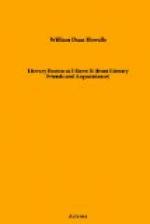Lowell once told me that Quincy had never had any calling or profession, because when he found himself in the enjoyment of a moderate income on leaving college, he decided to be simply a gentleman. He was too much of a man to be merely that, and he was an abolitionist, a journalist, and for conscience’ sake a satirist. Of that political mood of society which he satirized was an eminent man whom it was also my good fortune to meet in my early days in Boston; and if his great sweetness and kindness had not instantly won my liking, I should still have been glad of the glimpse of the older and statelier Boston which my slight acquaintance with George Ticknor gave me. The historian of Spanish literature, the friend and biographer of Prescott, and a leading figure of the intellectual society of an epoch already closed, dwelt in the fine old square brick mansion which yet stands at the corner of Park Street and Beacon, though sunk now to a variety of business uses, and lamentably changed in aspect. The interior was noble, and there was an air of scholarly quiet and of lettered elegance in the library, where the host received his guests, which seemed to pervade the whole house, and which made its appeal to the imagination of one of them most potently. It seemed to me that to be master of such circumstance and keeping would be enough of life in a certain way; and it all lingers in my memory yet, as if it were one with the gentle courtesy which welcomed me.
Among my fellow-guests one night was George S. Hillard, now a faded reputation, and even then a life defeated of the high expectation of its youth. I do not know whether his ‘Six Months in Italy’ still keeps itself in print; but it was a book once very well known; and he was perhaps the more gracious to me, as our host was, because of our common Italian background. He was of the old Silver-gray Whig society too, and I suppose that order of things imparted its tone to what I felt and saw in that place. The civil war had come and gone, and that order accepted the result if not with faith, then with patience. There were two young English noblemen there that night, who had been travelling in the South, and whose stories of the wretched conditions they had seen moved our host to some open misgiving. But the Englishmen had no question; in spite of all, they defended the accomplished fact, and when I ventured to say that now at least there could be a hope of better things, while the old order was only the perpetuation of despair, he mildly assented, with a gesture of the hand that waived the point, and a deeply sighed, “Perhaps; perhaps.”




